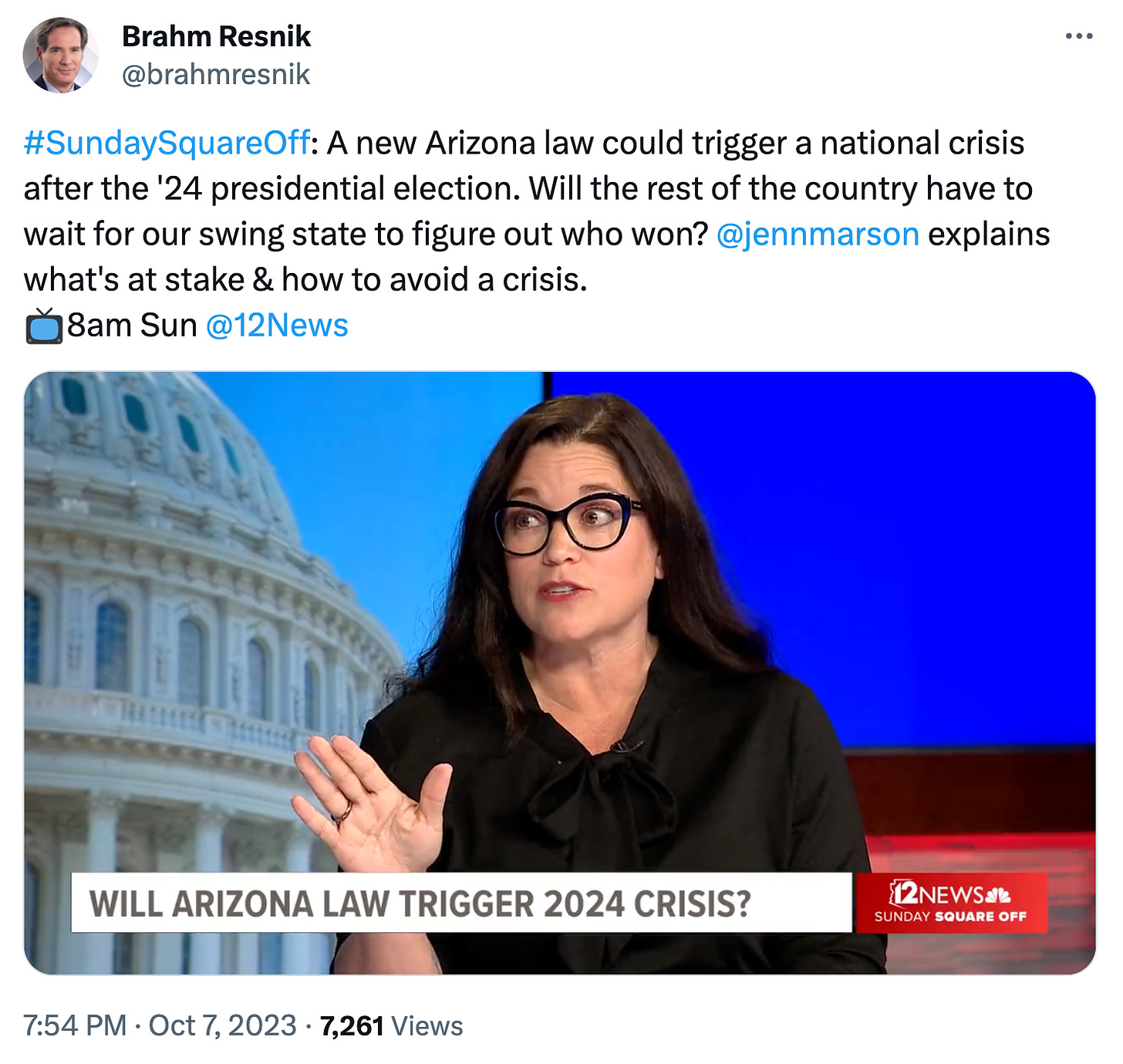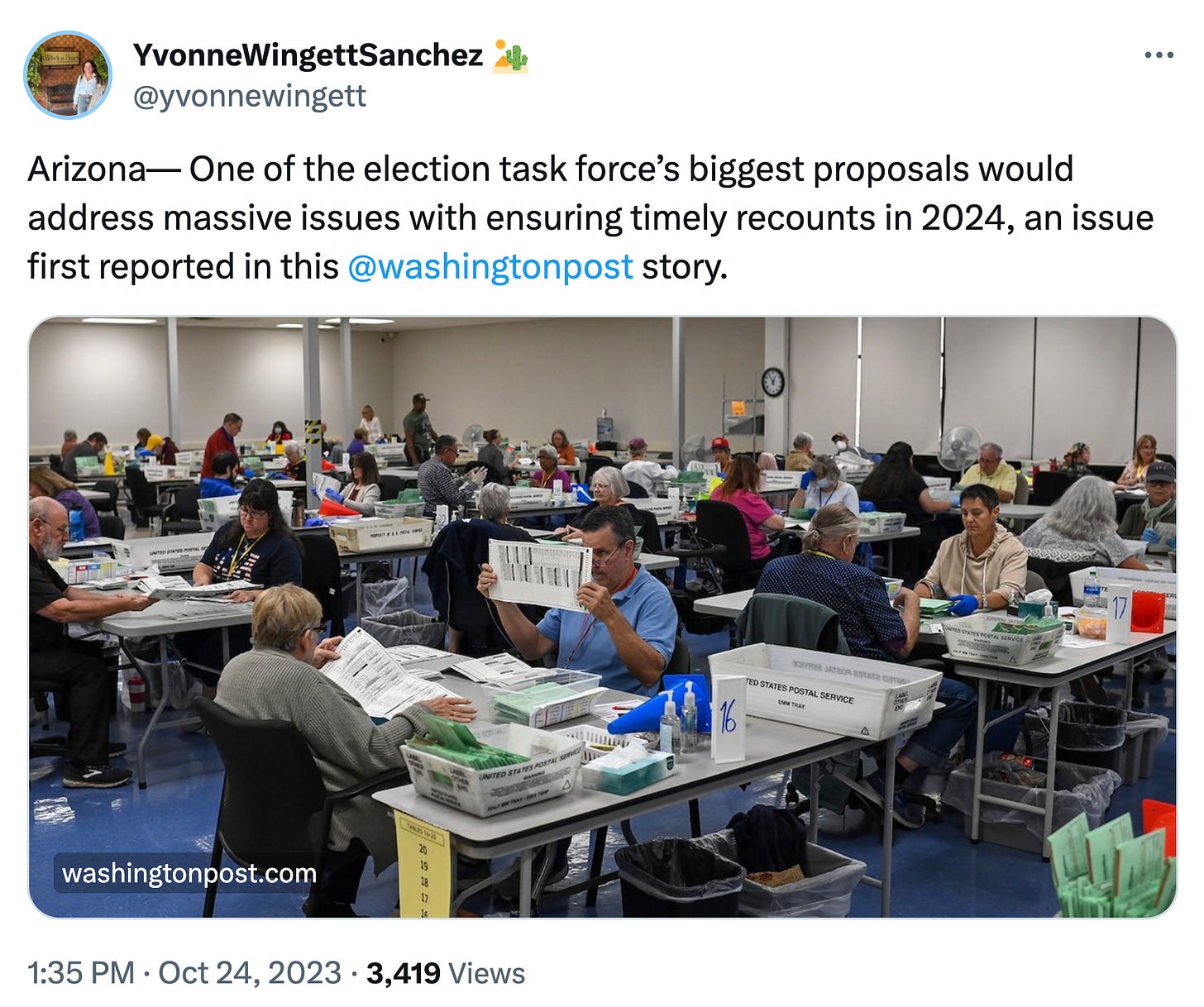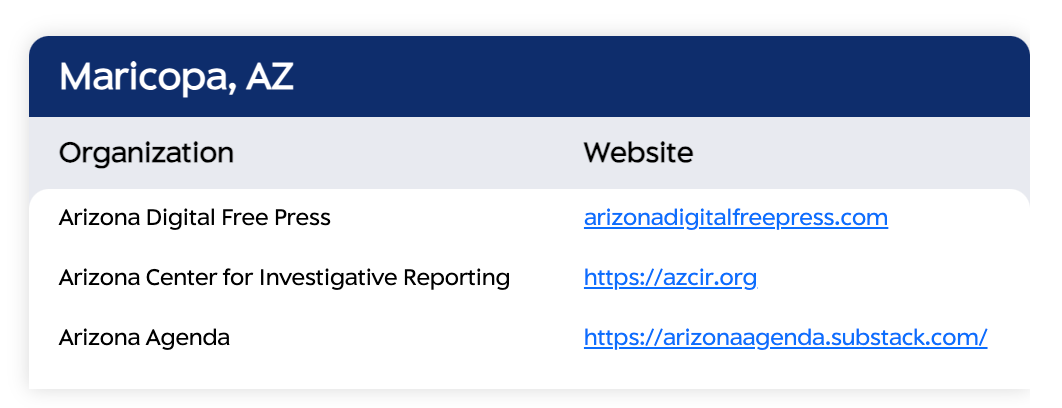The Daily Agenda: Recount rush
A recount race against the clock ... PTSD flashbacks to 2010 ... And Arizona's highest cactus.
Elections officials from Arizona’s counties are sounding the alarm about the state’s new recount law: It could put at risk Arizona’s chance to report its presidential election results.
After President Joe Biden’s razor-thin win in 2020, a bipartisan crew of lawmakers changed Arizona’s recount law so that more races will require recounts next year. Given Arizona’s already tight election timeline, those recounts could cause significant hiccups in the ability to smoothly transfer from the August primary to the November election.
And if the presidential race in Arizona goes to a recount, it could interfere with federal deadlines and create an electoral crisis, with the worst case scenario being Arizona missing the Presidential Electors meeting in mid-December and Arizonan’s electoral votes not being counted.
But if you ask former state Sen. Michelle Ugenti-Rita, who sponsored the state’s new recount law, she “wouldn't entertain (the counties’) hysteria.”
“The counties are arguing that the new recount rules will potentially cause deadline issues … Why would you change something when you don't even know for certain it's a problem?” she said.
Most lawmakers, even Republican Sen. Wendy Rogers, agree the timeline and recount law create a unique problem that lawmakers need to solve early next year. But Rogers has pledged to use the crisis as “a catalyst for addressing longstanding challenges” and address “the root of the problem, rather than simply treat the symptoms.” That is concerning for election officials who just want to see the timeline fixed, not for the issue to become Rogers’ catalyst for changing other laws.
Republican Sen. Ken Bennett, a former secretary of state, said the problem is “pretty well understood,” among his fellow Republicans, and he plans to offer legislation to fix the tight timelines. But that calls for bipartisan, and timely, action from lawmakers, who will have to resist the urge to throw in other election-related measures.
But Republican Sen. John Kavanagh told us that as long as any tacked-on provisions stand on their own merit, he doesn’t see a problem with adding them to a timeline fix.
“If, in fact, it's something that's worthwhile, then that's not an issue. But if it's something that's kind of toxic, that could be problematic,” he said.
Of course, lawmakers still need to figure out how exactly they’ll solve the problem. That could mean a combination of tweaks like moving up the primary election to put more time between due dates, as the Governor’s election task force recently suggested, or allowing recounts to start before the actual election certification.
And lawmakers have their own timeline to battle against. Laws usually go into effect 90 days after lawmakers adjourn for the year. But that’ll be too late. Putting the law on the books faster requires either a special session or an emergency clause (which requires support from two-thirds of lawmakers in each chamber, but would put the bill into effect immediately after the governor’s signature). Or some combination of both.
Kavanagh is confident lawmakers will agree on a solution in time for the elections.
“Our backs are against the wall, which usually means we'll act quickly. If it was a year away, I wouldn't be optimistic of a resolution. But we haven't got any real choice here,” Kavanagh said.
As for the merits of the recount law, Kavanagh supported it when it passed, and still thinks it’s a good idea to trigger recounts at a higher rate. It’s just a matter of fixing the laws to give election departments time to meet deadlines.
“It's not just a matter of fairness, it's also the perception,” he said. “When you have a super close election and you don't have a recount, then that's the fuel of conspiracy theories.”
You’re giving us flashbacks: As Texas Gov. Greg Abbot ponders signing Texas’ SB1070-esque legislation, Democrats protested at the Arizona Capitol today to say the bill would lead to widespread racial profiling and ultimately be ruled unconstitutional, as much of Arizona’s SB1070 was, per KJZZ’s Camryn Sanchez. Meanwhile, Republic columnist Phil Boas warns Texas to avoid Arizona’s errors.
“(T)he boycotts never did real damage to Arizona. The real damage was the erosion of trust between Latinos and the majority white population,” Boas writes.
Pile in: After longtime Pima County Supervisor Sharon Bronson announced her retirement last month, eight Democrats want the board to pick them as their next colleague. The Tucson Sentinel’s Dylan Smith has the list, which includes Matt Kopec, a one-year appointed lawmaker who lost his reelection bid in 2016 and says he’d just sit as a placeholder. Former House Minority Leader Andrés Cano, who recently quit the Legislature this summer to attend Harvard, may run for the office in 2024, Smith reports.
To be fair, our counties are really big: No newspapers died in Arizona last year, according to a new report from Northwestern University's Medill Local News Initiative, per Axios Phoenix’s Jeremy Duda. The state is one of only 11 that has at least one news source per county, including the Arizona Agenda.
Keep Arizona news sources from dying in 2024, too! Subscribe today.
Same story, different resource: While Arizona is trying to come to grips with foreign farming companies taking advantage of lax water laws, other states like Arkansas and Mississippi are looking to tighten their land ownership laws to prevent companies from “hostile” foreign nations from buying up farmland, Stateline’s Kevin Hardy writes.
It’s a big, empty desert: The streets of Puerto Peñasco, Sonora, were already empty on Monday, KTAR’s Will Stone reports, after federal officials closed the Lukeville port of entry connecting the beachfront town with Arizona. For some on-the-ground reporting from nearby Sasabe, check out The Border Chronicle’s latest. On the Cochise County side of Arizona’s border with Mexico, KJZZ’s Ron Dungan tags along with conservationist photographers whose trail cameras pick up a lot of wildlife and Border Patrol. Finally, Republic columnist Laurie Roberts thinks the president made a big mistake by closing Lukeville.
“For a guy who needs to win Arizona if he wants to be reelected, President Joe Biden has a strange way of showing it,” she writes.
Conflict resolved: The UA reinstated two professors who were suspended for viral comments about the Israel-Hamas conflict, the Republic’s Sarah Lapidus reports. The College of Education professors likened Hamas to the Black Panthers in class.
Never resign, Cochise County edition: Resigning from office wouldn’t be good for the criminal defense of Cochise County Supervisors Tom Crosby and Peggy Judd, even if they were so inclined to do so, the Arizona Capitol Times’ Kiera Riley reports. Riley digs into the history of Arizona officials charged with felonies — from Paul Petersen to Fife Symington — finding that an indictment rarely means a resignation.
“Last Week Tonight with John Oliver” took on organ and body donation programs and the inefficiencies in the system that lead to deaths.
Arizona’s donation mascot got a mention. But he certainly could have chosen a worse story to highlight from the Grand Canyon State.










